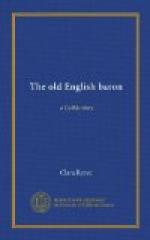Lord Lovel seemed almost choaked with passion, to see every one giving some mark of approbation and respect to Sir Philip. He called out—
“I demand to know who is this pretended heir, whom he brings out to claim my title and fortune?”
“My noble auditors,” said Sir Philip, “I shall appeal to your judgment, in regard to the proofs of my ward’s birth and family; every circumstance shall be laid before you, and you shall decide upon them.
“Here is a young man, supposed the son of a peasant, who, by a train of circumstances that could not have happened by human contrivance, discovers not only who were his real parents, but that they came to untimely deaths. He even discovers the different places where their bones are buried, both out of consecrated ground, and appeals to their ashes for the truth of his pretensions. He has also living proofs to offer, that will convince the most incredulous. I have deferred entering into particulars, till the arrival of Baron Fitz-Owen. I know his noble heart and honourable character, from one that has long been an eye-witness of his goodness; such is the opinion I have of his justice, that I will accept him as one of the judges in his brother’s cause. I and my ward will bring our proofs before him, and the company here present; in the course of them, it will appear that he is the best qualified of any to judge of them, because he can ascertain many of the facts we shall have occasion to mention. I will rest our cause upon their decision.”
Lord Graham applauded Sir Philip’s appeal, affirming his own impartiality, and calling upon Lord Clifford and his son, and also his own nephews who were present. Lord Clifford said—
“Sir Philip offers fairly, and like himself; there can be no place nor persons more impartial than the present, and I presume the Lord Lovel can have no objection.”
“No objection!” answered he; “what, to be tried like a criminal, to have judges appointed over me, to decide upon my right to my own estate and title? I will not submit to such a jurisdiction!”
“Then,” said Sir Philip, “you had rather be tried by the laws of the land, and have them pronounce sentence upon you? Take your choice, sir; if you refuse the one, you shall be certain of the other.”
Lord Clifford then said—“You will allow Lord Lovel to consider of the proposal; he will consult his friends, and be determined by their advice.”
Lord Fitz-Owen said—“I am very much surprised at what I have heard. I should be glad to know all that Sir Philip Harclay has to say for his ward, that I may judge what my brother has to hope or fear; I will then give my best advice, or offer my mediation, as he may stand in need of them.”
“You say well,” replied Lord Graham, “and pray let us come directly to the point; Sir Philip, you will introduce your ward to this company, and enter upon your proofs.”
Sir Philip bowed to the company; he went out and brought in Edmund, encouraging him by the way; he presented him to Baron Fitz-Owen, who looked very serious.




